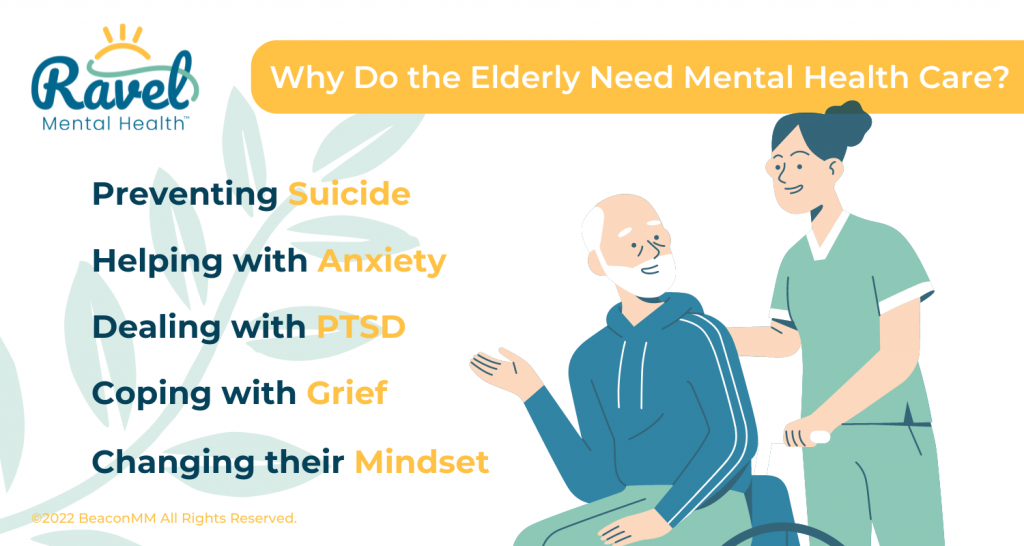Many people can benefit from going to therapy. It can help them deal with traumatic experiences or aid them through their life journey as they have difficulty making the best decisions for themselves.
And while the stigma behind mental health care is changing for the younger generations, the older ones have hit a wall. Some older adults may still view therapy negatively that they were taught when they were younger. And finding a therapist that works with the elderly can be difficult.
Even with those challenges, older people still have mental health needs. Here’s a guide on why more therapists should offer geriatric therapy and the benefits of offering this care to clients.
Are you looking to connect with new clients? Sign up for Ravel Mental Health today to get started!
Do the Elderly Need Mental Health Care?
Many have recognized the shift in negative stigmatization of mental health care by the younger generations. They’re a lot more open to receiving care and working through problems they may be facing. However, many still don’t seek help until they’re in their 20’s.
And while it’s great that a large demand for mental health care services has increased, not everyone is ready to get help. The older generations often don’t seek help due to the cultural influence they received growing up. Many weren’t told to process their emotions or that they should seek professional help to get through it.
Many seniors may have experienced some traumatic experiences that they may have not emotionally dealt with yet. Or they may be experiencing a new set of challenges that come along with retirement or declining physical health.
Having the help to get through these emotionally difficult times is crucial. Many seniors struggle with their mental health, and providing them the care they are looking for will save them from emotional distress and possibly suicide.
Why Do the Elderly Need Mental Health Care?

The drastic lifestyle changes that comes with aging can often be jarring for many older adults. They are dealing with life challenges that they may never have before.
When people retire, they have an excess amount of time that they didn’t have before. Then some begin to go through grieving processes when losing their loved ones. These events can trigger emotional difficulties that can make it difficult for the elderly to live their lives as they want to.
The US population is becoming increasingly older; an estimated number of Americans over 65 will double in the next 40 years. The large uptick of people who will need services means that there needs to be a shift in geriatric therapy. The following are some reasons why the elderly need mental health care and how you can support them.
1. Preventing Suicide
Many seniors struggle with their mental health for a multitude of reasons. And many of them don’t seek help when they need it. This can often lead to unfortunate events, such as suicide.
Men 75 and older are the most likely to die from suicide than any other demographic. They are an underserved population that has most likely never received mental health care and may not seek help on their own. This generation has typically been told that men should “toughen up” and repress their emotions.
When they follow through on that idea, it can often lead to them suffering in silence and not knowing it’s okay to ask for help. Therapists that provide geriatric therapy tailored to the life experiences of someone older can help offer services that may prevent suicide. Elderly patients can receive help for suicidal thoughts that may result from feelings of anxiety, hopelessness, or loneliness.
2. Helping with Anxiety
Anxiety disorders are very common in the elderly. One statistic shows that 18% of elderly patients in home care have an anxiety disorder. Many of them have common fears about aging that can lead to anxiety.
Factors such as the following can often lead to an anxiety disorder:
- Extreme stress or trauma
- Fear of falling
- Unable to afford living expenses or medications
- Being victimized
- Having to be dependent on others
- Being left alone
- Fear of death
- Complicated or chronic grief
- Alcohol, caffeine, or drugs
- A family history of anxiety disorders
- Other medical or mental illnesses
- Neurodegenerative disorders (such as Alzheimer’s or other dementias)
Counseling for their anxiety can help ease their stress and allow them to enjoy their life. They can be there for important family moments without dealing with anxiety.
Are you looking to grow your client base? Sign up for Ravel Mental Health today!
3. Dealing with PTSD
Anyone can find post-traumatic stress disorder (PTSD) difficult to deal with. But with people living longer, it increases the chance of experiencing traumatic events.
Elderly clients can often deal with forms of PTSD that have resulted from events such as:
- Death of friends or family
- Loss of a spouse
- Scary close-death experiences
- Veteran service
These experiences can often result in PTSD that may have never been dealt with. They may still be experiencing triggers or have a deep-rooted fear of death if they’ve experienced something traumatic. Providing them with therapeutic support will enable them to deal with PTSD and work through challenging emotions that may be leading to other mental conditions.
4. Coping with Grief
Grief can be challenging for anyone. It’s hard to go through the general phases of grief, including denial, anger, bargainer, depression, and acceptance. Since grief has no time limit, some elderly may still be grieving the loss of their spouse, loved ones, or friends.
Some may even experience grief when moving to retirement. When people choose to retire, they often feel like they’re living a completely different life. They may no longer be involved in the work they once were and have a lot of time to try hobbies. While the beginning stages of retirement can be great with time to relax, some people may fall into depression when feeling like their life has lost purpose.
Grieving can often lead to feelings of depression and may result in hopelessness or suicide. Providing geriatric therapy will enable them to seek help when having these difficult feelings of grief and may save them from developing a mental health condition.
5. Changing Their Mindset
Getting older can often lead to people having a decline in their physical health. They may experience chronic pain or joint difficulties that make it hard to do physical activities. This change can often be challenging to deal with.
Debilitating physical conditions can make it hard to cope with the lifestyle change. The elderly who was once active may take this the hardest as they are limited to what they can do and may need to depend on someone for help.
Many may experience depression when living with health deterioration or mental degradation. People living through this experience can benefit from therapy when they receive tools to deal with their emotions and change their frame of reference. It may help people avoid depression and enable them to find new ways to fulfill their life desires.
What Are the Benefits of Geriatric Therapy?
Therapists that provide geriatric therapy will help meet the growing need for care in this demographic. There aren’t enough therapists to focus on the large population of seniors in need. With such a large demand in this niche, it can help you drastically grow your client base.
Providing this care helps people get the mental health care they need and deserve. You can help them safely manage their emotions and medications. You can help advise which ones will be better for their overall mental health to keep them lively and excited for life.
If you’re looking to connect with more clients, Ravel Mental Health is the platform for you. It can help revolutionize your mental health practice.
It easily connects you with patients in need and works with your available schedule to have clients book appointments with you. With this platform, you’ll avoid losing time playing phone tag with potential patients, and will make it easier for your geriatric patients to get the services they’re looking for.
You can accept their appointment in a few easy clicks and get ready to help a wide variety of clients. All clinicians at your mental health practice can use their platform for their specialty. Don’t wait for the demand to get bigger; start connecting with clients in your area today.
Are you ready to help the elderly? Sign up for Ravel Mental Health today!
